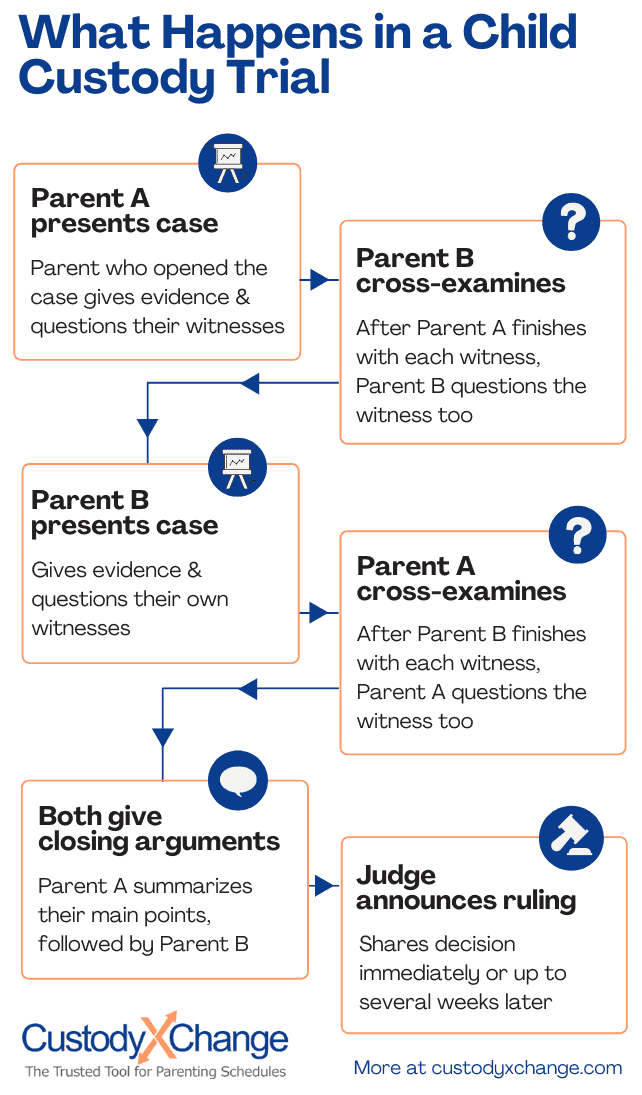How Do Custody Battles Work & How Long Do They Take?
Child custody cases are often called "custody battles" due to their competitive nature.
It's best for parents to work together rather than "battle." However, if you must go to court, it's important to understand how custody battles work to make the process as painless as possible.
Preparing for a custody battle
A lawyer will help you prepare the strongest case for custody. Contact your local legal aid office for free or low-cost legal help if you can't afford representation.
If you choose to represent yourself, familiarize yourself with the custody laws and court procedures in your area and research the best evidence for custody.
Start gathering documents early. You'll need:
- Your child's birth certificate
- Your child's school calendar
- Your child's extracurricular schedule
- Your child's medical records
- Your marriage certificate (if you're divorcing)
- Your financial records
- Your parenting plan proposal
How long do custody battles take?
An initial custody battle can resolve within a few months or last more than a year. It all depends on your court's calendar, your case details and your ability to compromise with the other parent.
If there are special circumstances like allegations of domestic violence, your custody battle will last longer as there will need to be investigations.
Many parents return to court again and again over disputes, so their battles go on indefinitely in a sense.
How do custody battles work?
A custody battle works by following the litigation process, which varies based on your location and the specifics of your case. The following is a common court process.
Step 1: Filing
A custody battle begins when a parent petitions for custody. You can typically request child support through the petition as well. If you're an unmarried parent, you may need to establish your child's paternity before petitioning for custody.
The other parent will have time to respond after they are served a copy of your petition. If they do not respond on time, you might win custody by default.
Step 2: Mediation
Many courts require parents to try mediation before ever attending a court session.
Some courts have mediation programs, and others require you to find an outside mediator. The court will choose your mediator if you and the other parent cannot agree.
If you reach an agreement, you can file it with the court to end your case. If you don't agree, the court process will continue.
Step 3: Hearings
At court hearings, parents appear before the judge so the case can progress. There are different types of hearings.
Temporary orders hearings are common during custody battles. Here, you'll get custody and visitation orders that will last the duration of your case. Parents can submit a temporary custody agreement to the court for judge approval or let the judge decide the orders. Temporary orders may become final orders if they work well.
Step 4: Discovery
Through discovery, parents collect evidence that will help them in trial or information that will help them reach a settlement.
Discovery may involve out-of-court witness questioning. You can use the transcripts or written answers to support your case in court.
During this time, there may also be a custody evaluation.
Step 5: Trial
You'll go to trial if you're unable to reach a settlement. A trial is where you and the other parent give your full arguments for custody.
Your lawyer will present your case for you, or you will present your case if you're self-represented.
The judge will make a decision based on what they've heard.

Step 6: Final order
A final order spells out your arrangements for custody and visitation as decided or approved by a judge. You'll typically receive a copy of your order in the mail.
Tips for custody battles
Prioritize your children: The custody battle and custody arrangement will have a huge impact on your children. Think of what will benefit them most — fighting with the other parent won't.
Don't make a scene in court: Court is not the place for instigating arguments. Only speak when you're called to. Leave your new partner at home. Address the judge formally, and respect everyone in the courtroom — including your ex.
Try to compromise: Reaching an agreement saves time and money. Not to mention that parents who agree are more likely to carry out the terms of their custody arrangements.
Using a parenting app to aid your custody battle
Preparation is the most important part of the custody battle.
Documents you might file as evidence include:
- A proposed parenting plan
- Proposed parenting time schedules
- A calendar of your child's activities
- A printout of messages exchanged with the other parent
- A log of your child's expenses
- A parenting journal

You can customize this to fit your situation with Custody X Change.
The Custody X Change online app lets you create all of these in one place. It makes sure you're ready to take on the custody process step-by-step.
